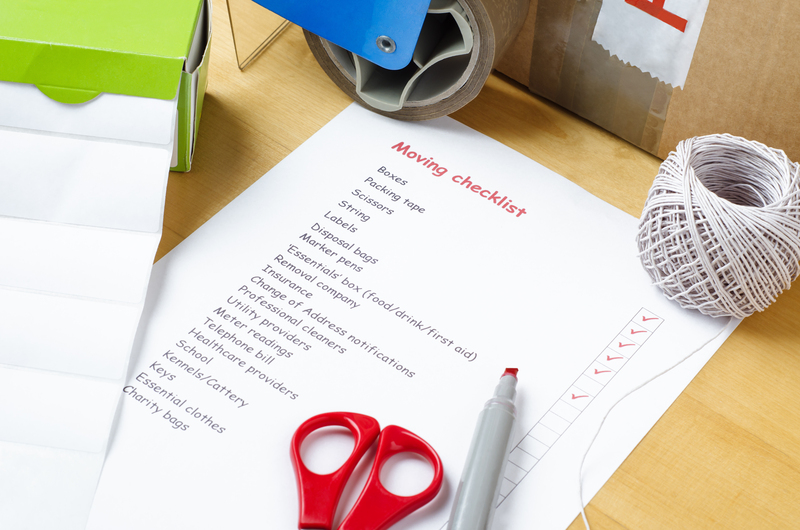Essential Tips for Packing Efficiently When Moving House
Moving to a new home is both an exciting and challenging undertaking. One of the most crucial steps in this journey is packing. The process can be overwhelming without a solid plan, but with the right strategies and organization, you can pack efficiently, save time, and ensure your belongings remain safe throughout the move. This comprehensive guide shares essential packing tips for moving house, covering everything from pre-planning to unpacking in your new abode.
Why Packing Efficiently is Important When Moving
Packing efficiently when moving to a new house minimizes stress, reduces the likelihood of damaged items, and speeds up both the moving out and settling in process. When you pack with forethought and organization, you're more likely to stay on schedule, save money on materials, and ensure nothing gets left behind.

Preparing to Pack: The Foundation of Efficiency
1. Create a Moving Timeline
Efficiency begins long before you start packing for a house move. Establish a realistic timeline outlining milestones, such as:
- Six to eight weeks before moving: Begin decluttering and sorting items by room and necessity.
- Four weeks out: Gather packing supplies, finalize date and details with movers.
- Two weeks before: Start packing non-essentials and seldom-used belongings.
- One week to go: Pack up daily-use items while keeping an essentials box handy.
2. Declutter and Downsize Before Packing
One of the best ways to pack for a move is to declutter before you begin. Walk room by room and set aside items you no longer need. Donate gently used clothing or household goods, and dispose of broken or unnecessary items. Not only does decluttering save packing time, but it also reduces moving costs by lessening the volume of boxes and weight.
3. Gather High-Quality Packing Supplies
Failing to have the right packing materials on hand can significantly slow your progress. Essential moving supplies include:
- Sturdy boxes in various sizes
- Bubble wrap and/or foam sheets for fragile items
- Packing paper or old newspapers
- Strong packing tape
- Labels and waterproof markers
- Furniture blankets or moving pads
- Stretch wrap for large items
- Resealable plastic bags for smaller parts and hardware
Investing in quality materials helps keep your possessions safe during the move, which is essential for efficient packing.
Packing Techniques: Maximizing Space and Minimizing Risk
1. Room-by-Room Packing Strategy
Pack one room at a time for greater efficiency. This approach keeps similar items together, simplifies labelling and unloading, and reduces the chance of forgetting anything. Use colored markers or labels to indicate each room, making the unpacking process much easier. For example, use blue for kitchen, green for bedrooms, and red for living areas.
2. Label Everything Clearly
Clearly label each box with its contents and the destination room. It's also useful to number your boxes for inventory tracking. Consider marking "Fragile" or "This Side Up" where appropriate. Proper labelling is a key packing tip for moving efficiently because it minimizes confusion for you and any professional movers involved.
3. Pack an Essentials Box
Set aside a box that contains everything you'll need for the first day and night at your new place. Items for the essentials box might include:
- Toiletries and medications
- Phone chargers and basic electronics
- Bedding, towels, and a change of clothes
- Basic cooking supplies and snacks
- Important documents and valuables
This will be the last box loaded and the first one unpacked, making your first 24 hours in your new home as seamless as possible.
4. Use the Right Size Boxes
Choose box sizes according to the weight and fragility of items:
- Small boxes: Books, canned goods, and heavy smaller items
- Medium boxes: Kitchenware and toys
- Large boxes: Light, bulky items like pillows, blankets, or clothing
Avoid overpacking large boxes with heavy items to prevent breakage and injury--this is crucial for efficient and safe packing when moving house.
5. Protect Fragile Items
Wrap all breakables in bubble wrap, packing paper, or soft linens. Put extra padding at the bottom and top of each box. Plates, for instance, should be packed vertically like records, while glasses should be placed upright and separated with packing material. Don't forget to label fragile boxes clearly!
6. Maximize Space When Packing
- Fill gaps with soft items: Use towels, socks, or scarves to fill empty spaces and cushion goods.
- Roll clothing: Rolling instead of folding clothes saves space and minimizes wrinkling.
- Pack boxes tightly: Properly packed boxes are less likely to collapse and shift in transit.
Time-Saving Packing Tips for Moving
1. Enlist Help
Invite friends or family members to lend a hand, or consider hiring professional packers for efficiency. Assign tasks based on strengths--for instance, a detail-oriented person might label boxes, while someone else packs up delicate kitchenware.
2. Keep a Digital Inventory
As you pack, create a detailed digital inventory of your belongings. This makes it far easier to verify nothing is lost or left behind, and simplifies the claims process if anything is damaged in transit.
3. Set Packing Goals for Each Day
Break your packing process into manageable chunks, setting daily goals such as "pack up the living room by tonight." This keeps you motivated and avoids last-minute panic.
4. Use What You Have on Hand
To save money and increase efficiency, use suitcases, laundry baskets, and even pots or pans to transport smaller items. This is an effective strategy for efficient packing when moving to a new house for anyone on a tight budget.
Common Packing Mistakes and How to Avoid Them
-
Procrastinating packing until the last minute
Start early to avoid unnecessary stress and rushed, haphazard packing. -
Mismatched or poor-quality boxes
Use sturdy and similarly sized boxes so they stack securely and protect items. -
Skipping labels
Failing to identify boxes can waste time and cause frustration during unpacking. -
Ignoring weight limits
Don't overfill boxes--aim for a mix of lighter and heavier items in larger boxes and keep small boxes for weighty goods. -
Forgetting specialty packing for valuables or sensitive items
Electronics, artwork, and jewelry need extra care. Use original packages when possible and/or invest in custom crates or padding.
Unpacking Tips for a Smooth Transition
1. Prioritize Unpacking Essentials
Start with your essentials box, then move onto the kitchen, bathrooms, and bedrooms. This ensures you can function comfortably as you settle in. Work room by room, using your labels and inventory to inform what to unpack next.
2. Dispose of Boxes Promptly
As you unpack, break down boxes and recycle or give away packing materials. This reduces clutter and helps your new space feel like home quicker.
3. Address Repairs and Utilities First
Take care of any urgent repairs or utility setup in each room before assembling furniture or decorating. Efficiency in this aspect streamlines your moving-in process, making your new house feel comfortable and functional in less time.
Key Takeaways: Packing Efficiently When Moving House
- Start early and have a clear plan--give yourself ample time to sort, declutter, pack, and label.
- Invest in quality packing materials to protect your belongings.
- Pack room by room and label everything clearly, ensuring efficient unpacking.
- Keep essentials separate for easy access on move-in day.
- Utilize space wisely--fill gaps with soft items and avoid overfilling boxes.
- Stay organized with inventories and checklists

FAQs: Packing for a House Move
What should you pack first when moving house?
Begin by packing items you use least often--such as out-of-season clothing, books, decor, and non-essential kitchen ware. Gradually work up to daily necessities as the move approaches.
How can I reduce packing stress?
Give yourself plenty of time, keep clutter to a minimum, and focus on one area at a time. Use checklists to track progress and remember, it's okay to ask for help!
Are professional packers worth it for an efficient move?
Hiring professionals can save significant time and hassle, especially for large households or those with special packing needs. Weigh the cost against your personal budget and timeline before making a decision.
Final Thoughts on Packing Efficiently for Your House Move
Packing may seem like a daunting task, but with a clear strategy, it's entirely manageable. Using these essential tips for efficient packing when moving house, you'll streamline the process, safeguard your belongings, and enjoy a smoother, less stressful transition to your new home. Remember, preparation is key--start early, stay organized, and your moving day will unfold with ease!
For more advice on moving tips and house-packing strategies, keep exploring our blog or contact relocation professionals who can guide you based on your unique needs.